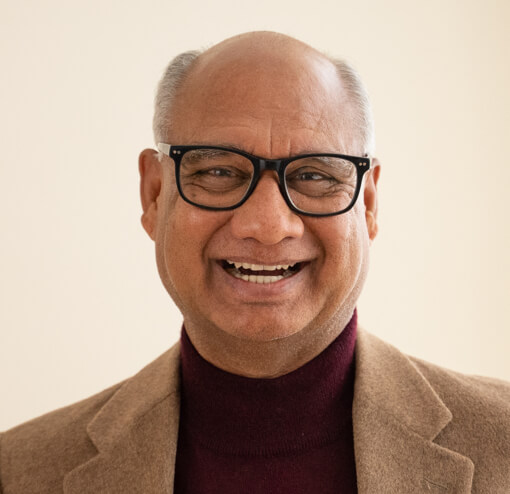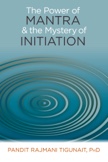A man had been coming to the Himalayan Institute for several years. He took weekend courses on meditation, the science of breath, and hatha yoga, and finally he spent a month in residence. After a long debate with himself he asked for an appointment for mantra initiation. When the day came I initiated him into mantra meditation, following the instructions of my master, Swami Rama (Swamiji). Afterwards, I invited him to come and see me if he had any questions after practicing the mantra. A few days later, he came and shared his experience with me. It was not a particularly uncommon experience, but somehow it released a flood of thoughts I had not had before.
The student reported that since receiving mantra initiation he had been experiencing a great sense of joy. His concentration was good, and as the sound of the mantra emerged in his mind, his entire being was infused with peace. He realized that he had at last found the peace and tranquility he had been seeking for so long. But after a day or two, fear set in. He began thinking, “Is this a magical spell? It is too peaceful. Will I be able to enjoy life as I used to? How will I be able to relate to my friends, who live a wild life? This kind of joy might suck me into yoga completely. I want to be happy, but I do not want to lose my competitive edge in business or the kind of self I used to cherish.”
In addition to harboring these doubts and fears, he was also feeling guilty because he was attempting to find God in a domain that was not part of his background. I attempted to console him by reminding him of what Christ says in the fourth chapter of Mark: “‘The sower soweth the Word. . . . but when they have heard, Satan cometh immediately, and taketh away the Word that was sown in their hearts.’
“My friend,” I continued, “You were looking for peace, tranquility of mind, and one-pointedness. Through the grace of God you got them. Try not to lose them. Your fears, doubts, insecurities, and guilt are baseless. The seed of the Word is there. Let it grow and blossom.
“Try to analyze the source of your fear. Isn’t it that you are afraid of being fearless, clear, one-pointed, and self-loving? Isn’t it that you are afraid of doubting your doubt or confronting your own negativity? Ask yourself, ‘What’s wrong if I’m happy?’
“As far as your fear of spiritual teachers is concerned, please remember that a human being has no power. It is the might of the Almighty that manifests in the form of love, compassion, kindness, and knowledge in human hearts. These godly virtues can never have an adverse effect on us.
No entity other than God has the power to exert any kind of influence on us—God alone is the power of all powers, the pool of primordial divine energy. To be fearful is to block the flow of divine radiance.
“Therefore, I advise you to continue doing your mantra lovingly, respectfully, and faithfully. Please don’t let the Satan living in the unlit corner of your mind drag the idea of Swamiji, other sages, or me into your spiritual crisis. Counsel the brighter part of your soul to emerge victorious in this inner battle. Let the soul, not the mind—which is afflicted with fear, doubt, insecurity, and guilt—decide whether or not you follow the path of meditation.”
This gentleman left a few days after our conversation. I do not know what path he chose, but this incident lingered in my mind. One day while walking home from my office, I found myself absorbed in the world of my own thoughts: “Are the manifestations of these tendencies necessary stages in our spiritual quest? What brings us to this path, and what causes us to leave it? What motivates us to become great seekers for a while, yet why do most of us eventually turn against that which we so dearly sought?”
With these questions turning in my mind, I began rereading scriptures I had read many times in the past: the Ramayana, the Bhagavad Gita, the Yoga Vasishtha, and the Upanishads. The questions I had been contemplating were so compelling that it seemed as I read that they were looking for answers on their own. And each time the answers manifested in the scriptures, I heard the affirming voices of Swamiji and other great souls—swamis Krishnananda, Sadananda, and Chaitanya Prakashananda—who had in the past kindly and unconditionally guided me on the path.
I noticed that one of the main themes emerging from the answers to all my questions was that fear and doubt are like an army of termites chewing away at the foundation and causing the entire structure of spirituality to collapse. And this brought me to the crux of the matter: spirituality and spiritual practice are rooted in realities that are not perceptible to the senses. Unfortunately, because many of us have developed a firm belief that the world we perceive through our senses is the real world, we find it difficult to turn away from it. Although we may find the high ideals of spirituality compelling, they are, we think, only ideals—we believe we have no way to actualize them in our life, no way to move from the realm of transitory pain and pleasure to the realm of eternal joy. A vast chasm seems to stretch between the outer world and the inner world. We feel the pull of the inner realm, but have no way to cross from here to there. For that we need a bridge.
Using divine words as the bridge, seekers from all times and traditions have completed their journeys from individual to cosmic, from mundane to divine, from short-lived pleasure to everlasting joy.
Mantra is one such bridge. All traditions—ancient and modern, Eastern and Western—tell us in one voice: the Word is the bridge between the immanent and the transcendent, between the manifest and the unmanifest. Using divine words as the bridge, seekers from all times and traditions have completed their journeys from individual to cosmic, from mundane to divine, from short-lived pleasure to everlasting joy.
But as I saw in my encounter with the troubled student, fear is a powerful obstacle. We have formed strong attachments to our cultural background, religious upbringing, and way of life. The thought of leaving this familiar domain and moving into the unknown is frightening. We question: “Who knows if this is the right bridge? Even if this is the right bridge, how do I know it’s sturdy?”
If we do not overcome our fear and doubt, they will force us to abandon the idea of crossing to the other shore. But if we hold the mantra in our mind and heart and stay clear and strong, we can start our journey, and as the mantra grows and blossoms within us, it will guide us to our true home.
Source: The Power of Mantra and Mystery of Initiation by Pandit Rajmani Tigunait

